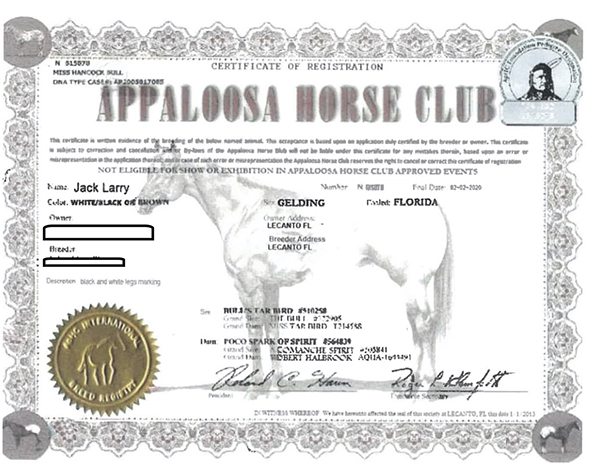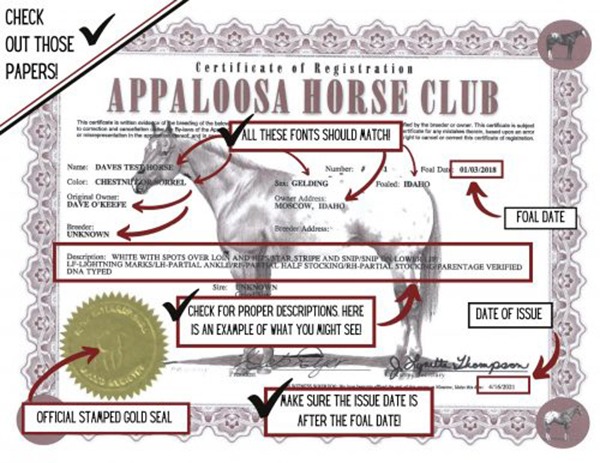Forged Registration Papers: What to Look Out For!

Example of forged papers.
By: Brittany Bevis
Earlier this month, it was brought to the attention of the Appaloosa Horse Club that forged registration papers were popping up within sale circles. We spoke with ApHC representative, Janet Marley, to find out why this is happening and what you can do to help ensure that a Certificate of Registration is valid.
“The first person to call about the papers gave us a registration number that did not match the name of the horse on the papers,” Janet says. “When we tried to look the horse up by the name, we did not have any horses registered with that name. We had him e-mail us a copy of the papers, and it was clearly an altered document. We believe this to be an internet scam to get money out of people. The scammer is requesting a deposit from people to either hold the horse for them, or to deliver the horse.”
Forging an official document isn’t easy, and there will always be errors and inconsistencies if you know what to look for.
Key items to check on a Certificate of Registration include the following:
1. Matching fonts
2. Foaling date
3. Date of issue- that the date of issue is after the foaling date
5. Proper description of the horse’s coloring
6. Official stamped gold seal
 In addition, Janet explains that ApHC always puts full color photographs of a horse on the back of the Certificate of Registration. “Prospective buyers should make sure that there are photographs on the back of the certificate and that those photographs match the horse they are looking to purchase,” Janet says. “Another thing to note in this particular situation is that the horse was being advertised as a ‘leopard’ Appaloosa, but the registration number had a ‘N’ in front of it, which would indicate the horse is Solid/Non-Characteristic.”
In addition, Janet explains that ApHC always puts full color photographs of a horse on the back of the Certificate of Registration. “Prospective buyers should make sure that there are photographs on the back of the certificate and that those photographs match the horse they are looking to purchase,” Janet says. “Another thing to note in this particular situation is that the horse was being advertised as a ‘leopard’ Appaloosa, but the registration number had a ‘N’ in front of it, which would indicate the horse is Solid/Non-Characteristic.”
If a prospective buyer has any questions about the validity of a Certificate of Registration, concerns should be directed to the ApHC registration department. “We will likely request a copy of the document to review,” she says. “Potential buyers can also report these cases to their local law enforcement and can report the case as a scam.”
Not only is it essential to have an official Certificate of Registration to ensure a horse can be bred, sold, or shown, it’s also very important to help preserve the Appaloosa breed as a whole.










